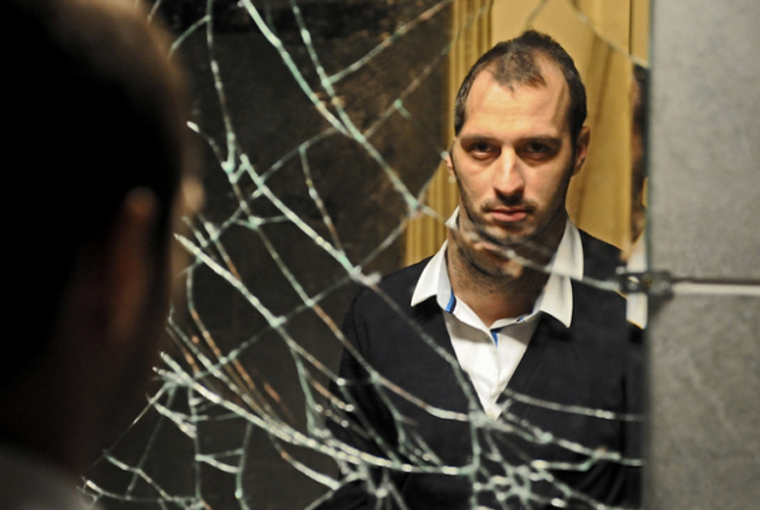Indecision
Paul Negoescu’s A Month in Thailand (O luna in Thailanda, 2012)
Vol. 29 (May 2013) by Alina Popescu
Paul Negoescu is the author of many appreciated short films. One month in Thailand represents his much-awaited debut in feature film. The film was made “with youngsters, for youngsters” and brings to public attention fresh new talented actors, as well as the youngest film team within the recent Romanian cinema industry.
The film focuses on Radu, a 30-something man who decides to separate from his girlfriend on New Year’s Eve and get back with his ex. In the beginning of the movie, one finds him and his girlfriend preparing for New Year’s Eve, doing some routine couple activities. Radu is easily bored and slightly absent. At midnight, when others celebrate, he lets her know drily that he does not wish to continue the relationship. He does not seem to know why he is making such a decision. Then he wanders from bar to bar looking for his ex, whom he eventually meets and persuades to come back to him. The film is built on the idea of the symmetry of Paul’s behavior in both relationships, suggesting a lack of emotional consistency. Paul’s indecision in love stands for an undefined feeling of dissatisfaction and is part of a quest for a more meaningful life.
Speculating on the topics the recent Romanian cinema got us used to, as soon as I heard the title, long before seeing the trailer, I wondered: why Thailand? Does the young protagonist want to raise money for a dream month in Thailand and then get in trouble with the local mafia? Does he decide to immigrate, tired of Romania and even Europe? Or, does he manage to migrate to Thailand but has to turn back because of family issues? The title sounded new and exotic, but it was neither. Thailand is the affordable exoticism for a certain category of middle-class Romanians and the holiday destination where Radu invites both of his girlfriends within 24 hours. It is the expression of an illusionary way of life and of the character’s indecision, which, according to the filmmaker, describes the generation in their thirties, to which he also belongs. Be it a problem of generation or not, the gallery of wishy-washy men in recent Romanian cinema (see for instance Boogie or Tuesday after Christmas) was enlarged with a new protagonist. So was the gallery of deceived women.
The film starts with a good premise: the topic of relationship has already brought Romanian cinema into wide attention because of the aforementioned film Tuesday after Christmas. And it seems that Negoescu undertook to address the subject targeting a younger and more eclectic public: people trapped in love dilemmas, fans of Minus’ music before the film has been released, moviegoers (cinéphiles) disappointed by Aurora, everyone who knows someone like Radu. The overall feeling after watching the movie is that Negoescu invited the audience to coffee and launched one of those topics that suddenly animate routine discussions between friends: relationships. Also, the film has a new way of looking at Bucharest, which is no more gray, oppressing, suffocating or chaotic, but colorful, vivid and enchanted (especially by night). Bucharest has many faces: it is the city where you make bar tours by taxi because they are cheap and anyway the night buses are not practical, where you go to certain clubs because you are sure that you will cross the person you’re in love with, it is the place where some still cultivate the illicit passion of climbing on buildings ‘roofs, despite the interphones and the neighbors. The film winks at its youngster public not only by showing this specific way of consuming the city or by staging highly recognizable places (like club Fabrica), but also by skillfully playing with the soundtrack. Minus1, a local DJ whose music is inspired by places and nostalgia, became even more popular thanks to Negoescu’s film and the other way round.
All in all, the novelty of the film is the recreation of the atmosphere of hanging out with friends in Bucharest. The message of the film is not difficult to get and is the kind of « Romanian relationship drama » one can watch while eating pop corn. But this is a film about indecision that finally reveals the filmmaker’s own indecision. Negoescu opts for a cold observational technique in order to capture the lightness of the characters, which finally keeps the spectator at distance and doesn’t allow him to get either emotional or analytical. Also, there are too many common-talkscenes, which end up trapping the characters at a derisory level of interaction. These are in strong contrast with the dream-like scenes, when Radu disconnects from reality, which finally turns him into a shallow film-character. There is also too much reasonableness, especially in the tense moments when one expects the action to rebound, when Radu confronts the current and the ex-girlfriends. One could imagine that Negoescu’s main concern was to get closer to a large audience by speaking about serious topics in a less sober manner than his older colleagues would have. Yet, what is certain for the moment is that the 30’s generation in Romanian cinema is still looking for its path.




Leave a Comment